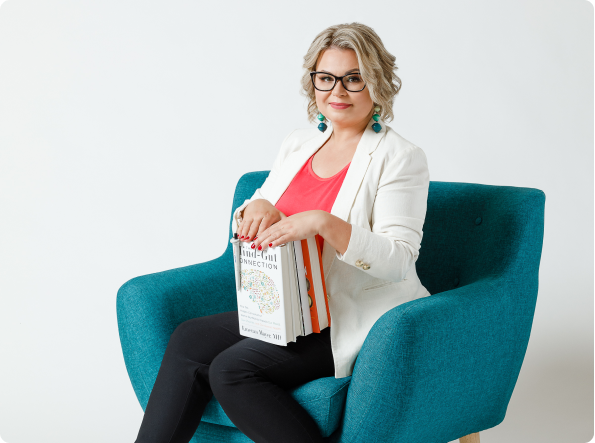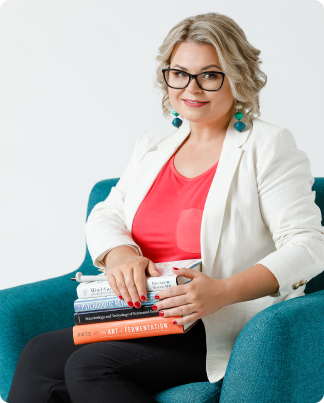About Me
My experience
Certain events in my life had a huge impact on my life and ultimately led me to where I am right now.
That’s why I think it is important to share it with the World.
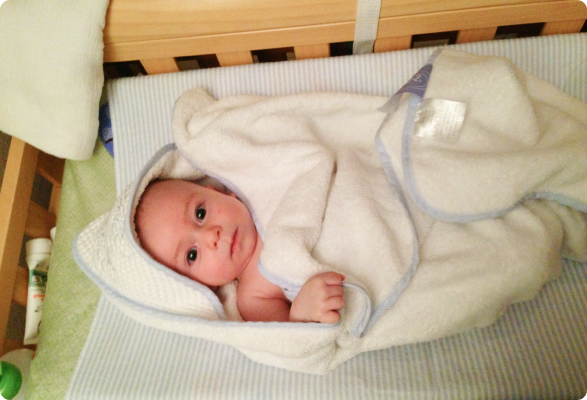
On July 8th, 2012 I was a post-doctoral research scientist working in the field of gut microbiota at Baylor College of Medicine and Texas Children’s Hospital. I was newly married and about to have my first baby boy. I was all prepared to have a natural birth, no epidural, breastfeed him and become the best mom in the world. However, my book of life had a slightly different scenario.
I had to be induced, because my son was 10 days overdue. Induced contractions were so strong I thought I was going to die. So I did ask for an epidural during the last window I was allowed to have. We followed all the recommendations of the American Academy of Pediatrics and our pediatricians regarding vaccinations and everything else. It was our first time becoming parents and I was a scientist, therefore I completely trusted the medical system and a team of doctors surrounding us.
Photo: My son Aaron is 3 months old here, October 9th 2013
I tried to learn how I could help my family, but none of the doctors that I had contacted at Baylor College of Medicine or M.D. Anderson could give me any hope regarding my dad. They told me that nothing could be done and that all I could do was to prepare for my father’s death. I started reading how our diet is connected to our health, but the information didn’t connect with the doctors’ advice. I kept asking questions but was not getting answers. Slowly but surely I started to realise how important our diet was for our health and disease.
Photo: Myself and my dad (RIP), 1981
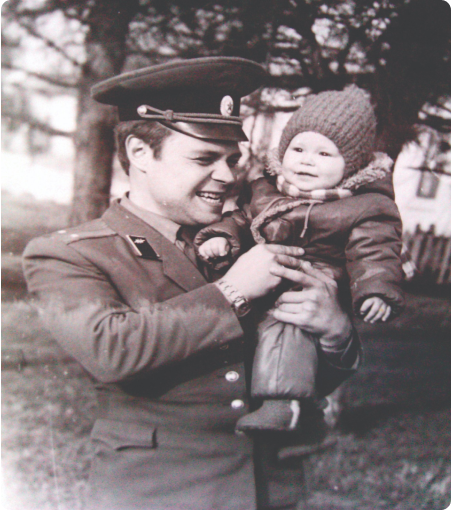
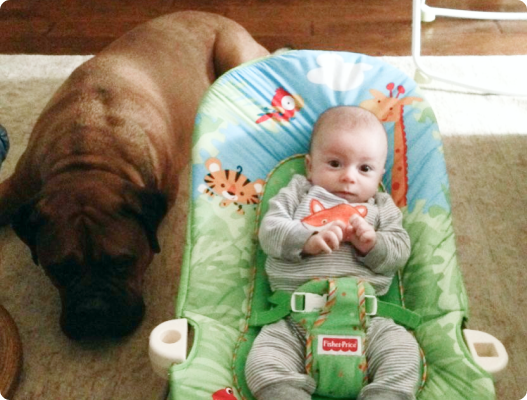
I feel like we tried everything to help my son, but he was just not eating. Our pediatrician even diagnosed him with failure to thrive. Later, when my son was about a year and a half, the doctors finally listened to me and suggested running a gastric emptying test. This test showed a significant delay in food transition throughout GI and he was eventually diagnosed with gastroparesis. It was very ironic because I was studying the microbiology of the GI tract while my son was having motility issues.
Unfortunately, no one could explain why this was happening or what exactly could be done to fix this condition. As a side effect of gastroparesis, my son developed a psychological food aversion that delayed development of chewing reflex and loss of interest in food. He was very sensitive to textures in food and could start gagging and throwing up at any time. He was eating exclusively homemade purees until he was 5 while his peers at school were chewing real solid foods.
Photo: My son Aaron (3 months old) and our dog Russo, October 2nd 2013
We did give a try to some drugs that were recommended by pediatric GI doctors but they made the symptoms even worse. Speech therapy that was supposed to help with food aversion and teach my son to chew was a complete failure too! They tried to teach him chewing using junk food that we would never ever eat ourselves. I was experiencing a great deal of emotional pain as I struggled to find answers and solutions, but receiving my son’s diagnosis helped to alleviate some of the stress about his condition and symptoms. Knowing the reason why he had no appetite allowed me to follow my gut feeling and knowledge I received from years of studying.
Photo: My 2 year old son Aaron and me at a pottery class, August 21st 2015
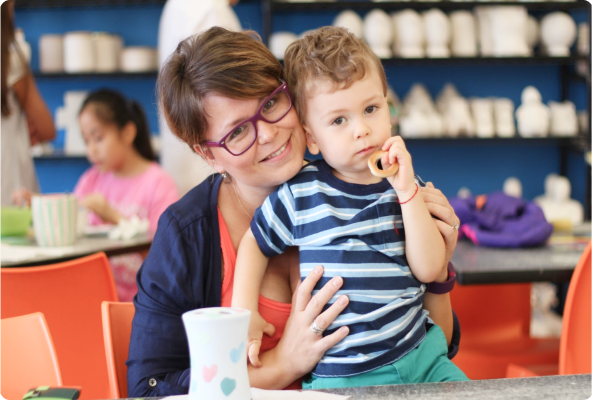
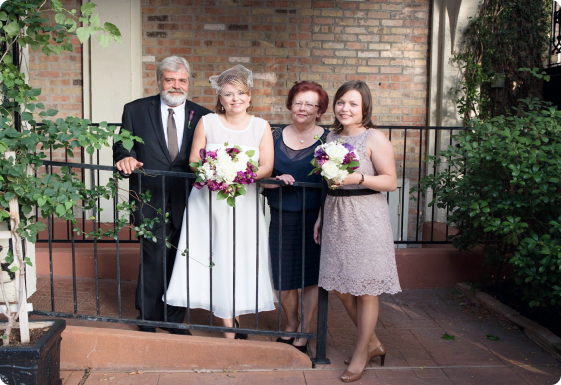
While we were trying to find answers to my son’s problems, my dads’ health was declining. He lasted for about a year and a half before passing away from lung cancer. It was a very tragic loss for me. He was only 59 and could have lived for many more years, got to know and spend time with grandkids. While he was sick, I learned a lot about cancer and how it works and how nutrition is important to prevent many diseases including cancer. Only 10-15% of cancers are actually predisposed genetically, meaning that most cancers are triggered by one’s environment and habits.
Photo: With my dad, mom and sister on my wedding day, October 18th 2012
After my dad had passed away, I came across a newly-formed Russian Facebook group “Food and Medicine” created by a nutritionist, who quickly became a friend of mine. I joined it and started talking about the microbiome and probiotics. As an expert in that field, I was able to use my knowledge to help members of the group and answer their questions. Everyone was extremely interested, and they later asked me to create a blog. I started to receive many more questions on Facebook, which led me to start doing consultations in addition to blogging. When the influx of consultation appointments increased, I also created an online program: “Healthy Microbiome – Healthy Body”.
Photo: With my family: husband Arthur, son Aaron (5 yo) and daughter Mila (2.5 yo), fall 2018
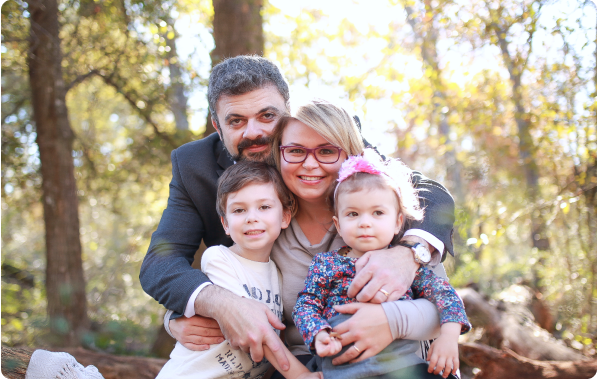
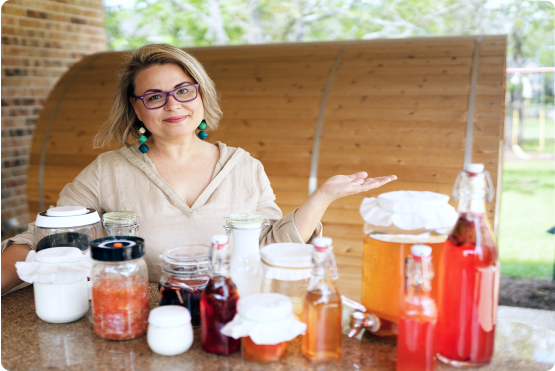
Now I have an online school that I am co-hosting with the same friend of mine who introduced me into the world of “Food and Medicine”.
Right now, I’m working on a second course on fermentation, which I believe could easily become a number #1 next generation superfood.
Photo: Showing here all my ferments, spring 2021
My experience
Certain events in my life had a huge impact on my life and ultimately led me to where I am right now.
That’s why I think it is important to share it with the World.
On July 8th, 2012 I was a post-doctoral research scientist working in the field of gut microbiota at Baylor College of Medicine and Texas Children’s Hospital. I was newly married and about to have my first baby boy. I was all prepared to have a natural birth, no epidural, breastfeed him and become the best mom in the world. However, my book of life had a slightly different scenario.
I had to be induced, because my son was 10 days overdue. Induced contractions were so strong I thought I was going to die. So I did ask for an epidural during the last window I was allowed to have. We followed all the recommendations of the American Academy of Pediatrics and our pediatricians regarding vaccinations and everything else. It was our first time becoming parents and I was a scientist, therefore I completely trusted the medical system and a team of doctors surrounding us.
Photo: My son Aaron is 3 months old here, October 9th 2013

I tried to learn how I could help my family, but none of the doctors that I had contacted at Baylor College of Medicine or M.D. Anderson could give me any hope regarding my dad. They told me that nothing could be done and that all I could do was to prepare for my father’s death. I started reading how our diet is connected to our health, but the information didn’t connect with the doctors’ advice. I kept asking questions but was not getting answers. Slowly but surely I started to realise how important our diet was for our health and disease.
Photo: Myself and my dad (RIP), 1981

I feel like we tried everything to help my son, but he was just not eating. Our pediatrician even diagnosed him with failure to thrive. Later, when my son was about a year and a half, the doctors finally listened to me and suggested running a gastric emptying test. This test showed a significant delay in food transition throughout GI and he was eventually diagnosed with gastroparesis. It was very ironic because I was studying the microbiology of the GI tract while my son was having motility issues.
Unfortunately, no one could explain why this was happening or what exactly could be done to fix this condition. As a side effect of gastroparesis, my son developed a psychological food aversion that delayed development of chewing reflex and loss of interest in food. He was very sensitive to textures in food and could start gagging and throwing up at any time. He was eating exclusively homemade purees until he was 5 while his peers at school were chewing real solid foods.
Photo: My son Aaron (3 months old) and our dog Russo, October 2nd 2013

We did give a try to some drugs that were recommended by pediatric GI doctors but they made the symptoms even worse. Speech therapy that was supposed to help with food aversion and teach my son to chew was a complete failure too! They tried to teach him chewing using junk food that we would never ever eat ourselves. I was experiencing a great deal of emotional pain as I struggled to find answers and solutions, but receiving my son’s diagnosis helped to alleviate some of the stress about his condition and symptoms. Knowing the reason why he had no appetite allowed me to follow my gut feeling and knowledge I received from years of studying.
Photo: My 2 year old son Aaron and me at a pottery class, August 21st 2015

While we were trying to find answers to my son’s problems, my dads’ health was declining. He lasted for about a year and a half before passing away from lung cancer. It was a very tragic loss for me. He was only 59 and could have lived for many more years, got to know and spend time with grandkids. While he was sick, I learned a lot about cancer and how it works and how nutrition is important to prevent many diseases including cancer. Only 10-15% of cancers are actually predisposed genetically, meaning that most cancers are triggered by one’s environment and habits.
Photo: With my dad, mom and sister on my wedding day, October 18th 2012

After my dad had passed away, I came across a newly-formed Russian Facebook group “Food and Medicine” created by a nutritionist, who quickly became a friend of mine. I joined it and started talking about the microbiome and probiotics. As an expert in that field, I was able to use my knowledge to help members of the group and answer their questions. Everyone was extremely interested, and they later asked me to create a blog. I started to receive many more questions on Facebook, which led me to start doing consultations in addition to blogging. When the influx of consultation appointments increased, I also created an online program: “Healthy Microbiome – Healthy Body”.
Photo: With my family: husband Arthur, son Aaron (5 yo) and daughter Mila (2.5 yo), fall 2018

Now I have an online school that I am co-hosting with the same friend of mine who introduced me into the world of “Food and Medicine”.
Right now, I’m working on a second course on fermentation, which I believe could easily become a number #1 next generation superfood.
Photo: Showing here all my ferments, spring 2021

My work in the microbiome field has naturally evolved into many forms. It truly is my passion!
I hope to help more people by sharing the role of microbiome health in preventing many different chronic diseases through my blog, consultations and online programs.
Consultations are available at a fee. For more information click here.
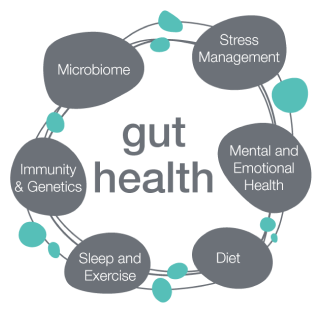
My career path: from bacteriocins to gut microbiome and enteric nervous system
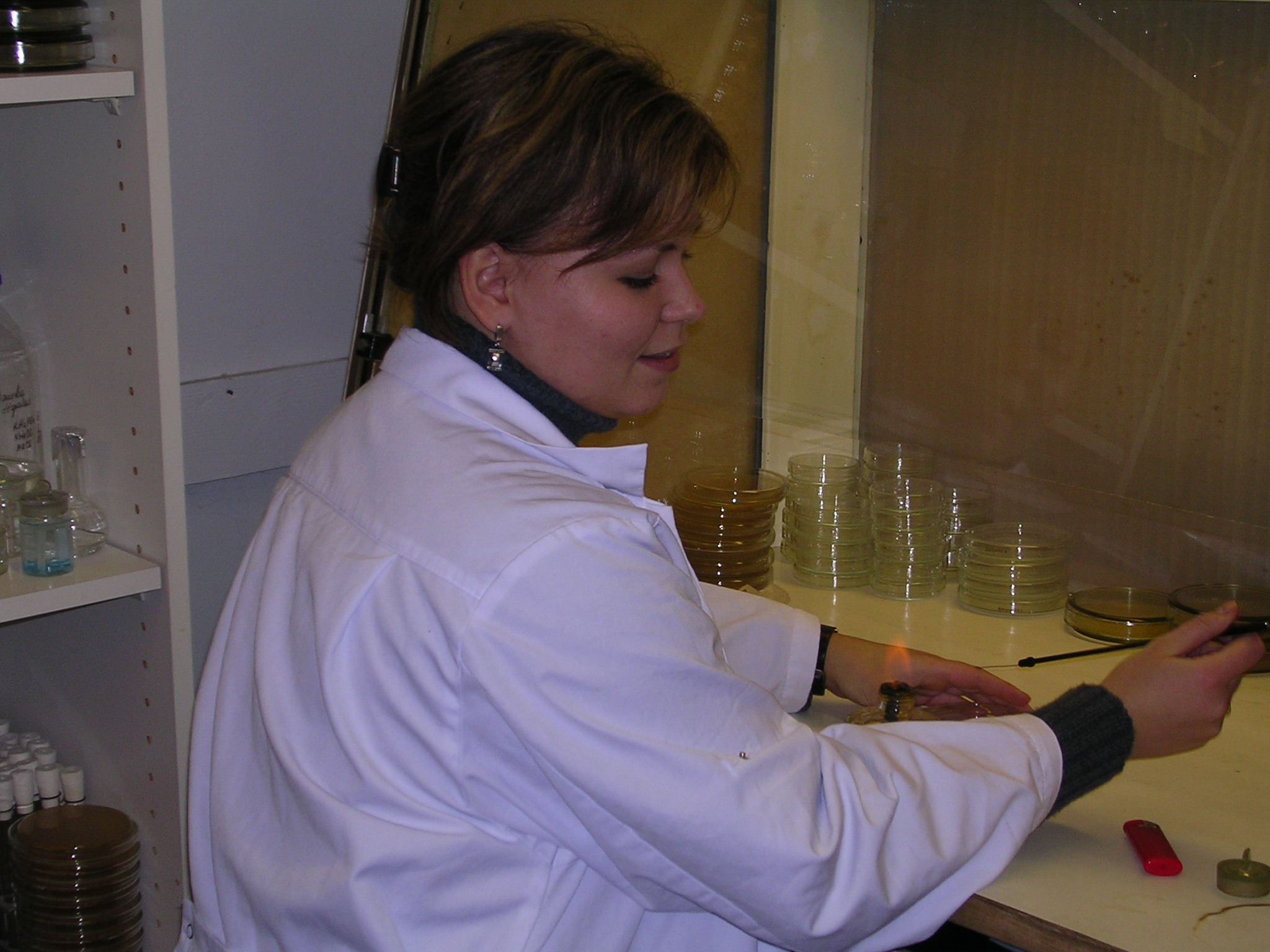
I was born in the capital of a small but beautiful Eastern European country Lithuania – Vilnius. Here are a few details about my credentials. I graduated from Vilnius University with BS in Biology and MS in Microbiology, where the focus of my research was antimicrobial peptides, also called bacteriocins, produced by thermophilic (living in hot temperatures) bacteria found in oil wells. As a side note, quite a few gut bacteria also produce these peptides to help us fight infections.
Photo: Vilnius University, Department of Microbiology, 2001
I received my doctorate degree from University College Cork and APC Microbiome Institute located in Ireland on the topic of probiotic Bifidobacterium breve and its carbohydrate metabolism. APC Microbiome Institute is one of the top microbiome institutes in the world and leads the world in many areas of the microbiome field. I have published 4 peer-reviewed publications as a result of my research in Ireland. My research focused on what promotes the growth of good bacteria, probiotics. At that time, only a few people knew what that term “probiotics” means and they were not well studied.
Photo: My lab mates and myself in Dr. Van Sinderen Lab at Alimentary Pharmabiotic Center in University College Cork, Ireland, 2006
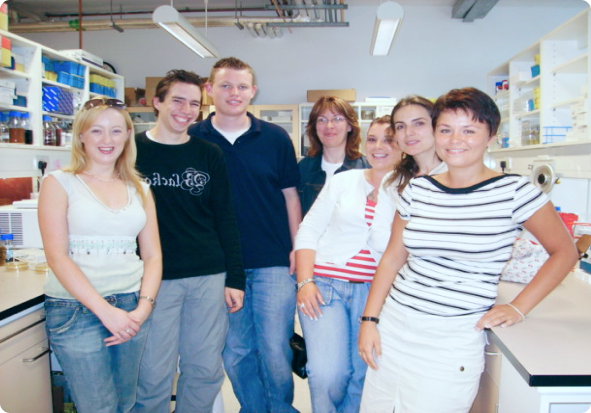
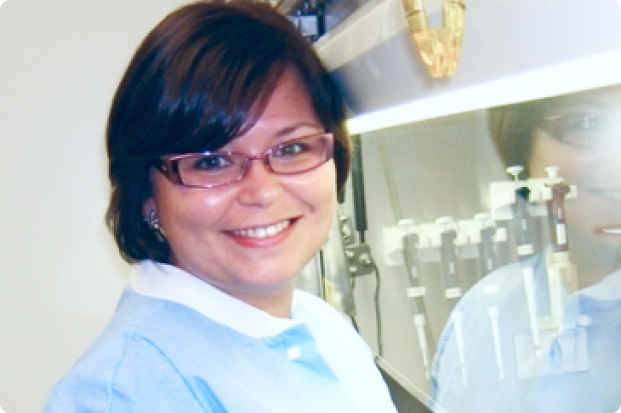
Then, I moved to the United States of America and continued my research in the area of intestinal microbiota and probiotic bacteria in the Department of Nutrition and Food Science at Texas A&M University. My passion for researching probiotics and the microbiome extended from my studies to my future research. I considered microbiota an extremely important field of research, and microbiome studies have proved to be an increasingly relevant topic to the present day. When I learned about the Human Microbiome Project research conducted at the Versalovic Lab while writing my Ph. D. thesis, I emailed Dr. Versalovic immediately and told him that I would love to work in his lab. I started my work at Baylor College of Medicine after he gave me a special position in the Versalovic Lab in the Department of Pathology and Immunology at Baylor College of Medicine and Texas Children’s Hospital.
Photo: Working with tissue cultures in Dr. Versalovic Lab at Baylor College of Medicine and Texas Children’s Hospital, Houston, Texas, USA, 2010
There, I researched how good bacteria, specifically Bifidobacterium dentium, interact with our enteric (intestinal) nervous system and the outcomes of this interaction. Studying the interactions between the gut and brain in addition to the functions of bacteria was so new and interesting to me that I published a separate research paper on those studies. I was also involved with research on another probiotic strain Lactobacillus reuteri, which is scientifically proven to provide a number of health benefits, starting with antibacterial properties and ending with the potential to change social behavior. Last but not least, I teach Biology, Microbiology and Nutrition courses at Houston Community College.
Photo: Myself and Maya Ivanjesku (microbiome friendly skincare developer) at the Microbiome Conference in San Diego, USA, 2018
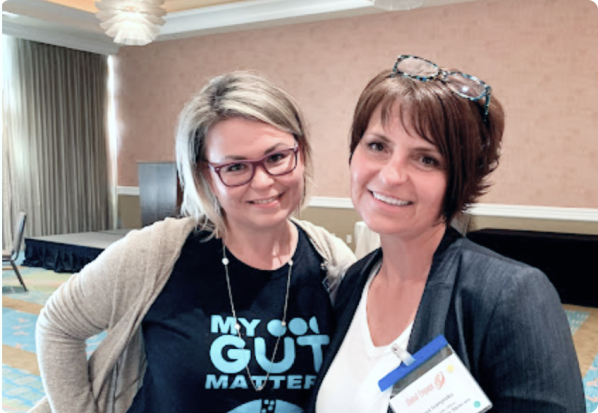
To sum it up, I have experience in research focusing on intestinal beneficial microbe-host interaction (in particular microbiota-gut-brain axis) as well as oilfield microbiology combined with professional experience in the Pharmaceutical Industry. During my research years I presented scientific work internationally and published a number of research articles in well respected scientific journals.
Video: My interview at International Conference ASM-2012, where I was invited to share my research with the public.
My career path: from bacteriocins to gut microbiome and enteric nervous system
I was born in the capital of a small but beautiful Eastern European country Lithuania – Vilnius. Here are a few details about my credentials. I graduated from Vilnius University with BS in Biology and MS in Microbiology, where the focus of my research was antimicrobial peptides, also called bacteriocins, produced by thermophilic (living in hot temperatures) bacteria found in oil wells. As a side note, quite a few gut bacteria also produce these peptides to help us fight infections.
Photo: Vilnius University, Department of Microbiology, 2001

I received my doctorate degree from University College Cork and APC Microbiome Institute located in Ireland on the topic of probiotic Bifidobacterium breve and its carbohydrate metabolism. APC Microbiome Institute is one of the top microbiome institutes in the world and leads the world in many areas of the microbiome field. I have published 4 peer-reviewed publications as a result of my research in Ireland. My research focused on what promotes the growth of good bacteria, probiotics. At that time, only a few people knew what that term “probiotics” means and they were not well studied.
Photo: My lab mates and myself in Dr. Van Sinderen Lab at Alimentary Pharmabiotic Center in University College Cork, Ireland, 2006

Then, I moved to the United States of America and continued my research in the area of intestinal microbiota and probiotic bacteria in the Department of Nutrition and Food Science at Texas A&M University. My passion for researching probiotics and the microbiome extended from my studies to my future research. I considered microbiota an extremely important field of research, and microbiome studies have proved to be an increasingly relevant topic to the present day. When I learned about the Human Microbiome Project research conducted at the Versalovic Lab while writing my Ph. D. thesis, I emailed Dr. Versalovic immediately and told him that I would love to work in his lab. I started my work at Baylor College of Medicine after he gave me a special position in the Versalovic Lab in the Department of Pathology and Immunology at Baylor College of Medicine and Texas Children’s Hospital.
Photo: Working with tissue cultures in Dr. Versalovic Lab at Baylor College of Medicine and Texas Children’s Hospital, Houston, Texas, USA, 2010

There, I researched how good bacteria, specifically Bifidobacterium dentium, interact with our enteric (intestinal) nervous system and the outcomes of this interaction. Studying the interactions between the gut and brain in addition to the functions of bacteria was so new and interesting to me that I published a separate research paper on those studies. I was also involved with research on another probiotic strain Lactobacillus reuteri, which is scientifically proven to provide a number of health benefits, starting with antibacterial properties and ending with the potential to change social behavior. Last but not least, I teach Biology, Microbiology and Nutrition courses at Houston Community College.
Photo: Myself and Maya Ivanjesku (microbiome friendly skincare developer) at the Microbiome Conference in San Diego, USA, 2018

To sum it up, I have experience in research focusing on intestinal beneficial microbe-host interaction (in particular microbiota-gut-brain axis) as well as oilfield microbiology combined with professional experience in the Pharmaceutical Industry. During my research years I presented scientific work internationally and published a number of research articles in well respected scientific journals.
Video: My interview at International Conference ASM-2012, where I was invited to share my research with the public.
My passion is to help people understand the science of gut microbiota, probiotics and in general gut health through this blog and my social media accounts, that I am building based on all my knowledge of cutting edge science.
Diplomas
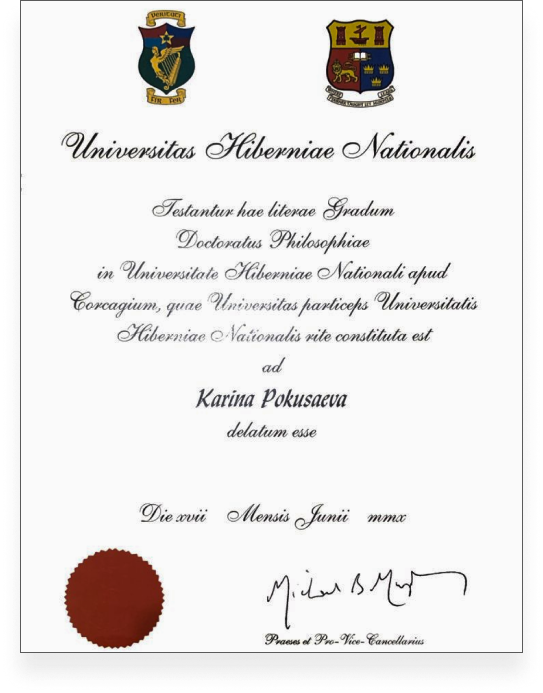
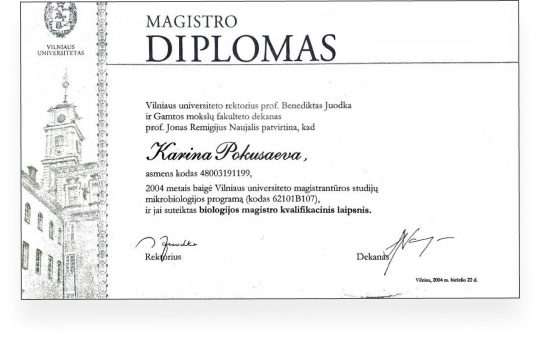
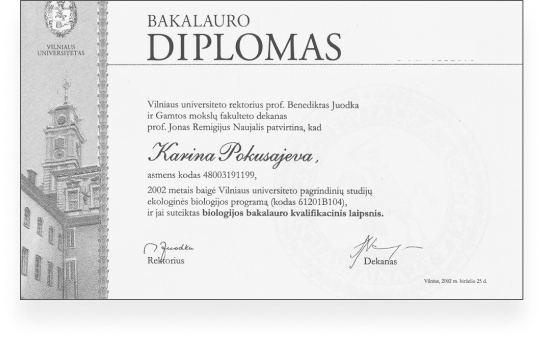
My publications
Pokusaeva, K., and D. van Sinderen, (2011) Carbohydrate Metabolism in Bifidobacteria. Genes Nutr 6(3):285-306.
Pokusaeva, K., O’Connell-Motherway, M., Zomer, A., MacSherry, J., Fitzgerald, G.F. & van Sinderen. (2011) Cellodextrin Utilization by Bifidobacterium breve UCC2003. Appl Environ Microbiol 77(5):1681-90.
Pokusaeva, K. and J. Versalovic, (2011) Immunomodulatory Effects of the Intestinal Microbiota and Compounds Derived from Beneficial Microbes. Functional Food Reviews 3(2):49–61.
Pokusaeva, K., Kuisiene, N., Jasinskyte, D., Rutiene, K., Saleikiene, J., and D. Chitavichius (2009) Novel bacteriocins produced by Geobacillus stearothermophilus. Cent Eur J Biol 4: 196-203.
Pokusaeva, K., Neves, A.R., Zomer, A., O’Connell-Motherway, M., MacSharry, J., Curley, P., Fitzgerald, G.F. & van Sinderen. (2009) Ribose utilization by the human commensal Bifidobacterium breve UCC2003. Microbial Biotechnology 3: 311-323.
Pokusaeva, K., O’Connell-Motherway, A. Zomer, G. F. Fitzgerald & D. van Sinderen, (2009) Characterization of two novel alpha-glucosidases from Bifidobacterium breve UCC2003. Appl Environ Microbiol 75: 1135-1143.
Wang, Kim, Y., Pokusaeva, K., Sturino, J.M. & T. K. Wood, (2010) Cryptic Prophage Help Bacteria Cope with Adverse Environments. Nat Commun 1:147.
Sturino, J.M., Zorych, I., Mallick, B., Pokusaeva, K., Carroll, R.J. & N. Bliznuyk. (2010) Statistical Methods for Comparative Phenomics Using High-throughput Phenotype Microarrays. The International Int J Biostat 6(1). pii: Article 29.
Pokusaeva, K., Johnson, C., Luke, B., Uribe, G. , Engler, D., Matsunami, R., Lugo, M., Major, A., Mori-Akiyama, Y. , Hollister, E.B., Dann, S., Shi, X.Z., Oezguen, N., Savidge, T., and Versalovic, J. (2016) GABA-producing Bifidobacterium dentium modulates visceral sensitivity in the intestine. Neurogastroenterol Motil. [Epub ahead of print].
Invited speaker at the ASM2012, San Francisco, CA. Title of the presentation: “Production of Gamma-Aminobutyric Acid by Intestinal CommensalBifidobacterium dentium.”
“Intestinal bacteria produce neurotransmitter, could play role in inflammation”. ScienceDaily 2012
Live Interview at ASM2012, San Francisco, CA. Title of the interview: “Microbial Colonization and the Host: Do the Colonists Reshape the Landscape?”

If you have any questions, a topic in mind that you would like me to cover, would like to work with me or simply share your thoughts please contact me.


